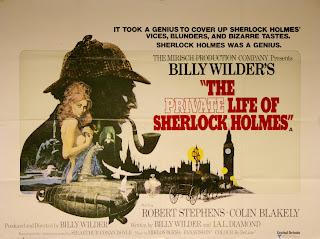
Four years after directing the hilarious comedy The Fortune Cookie, Billy Wilder once again stepped behind the camera to helm The Private Life of Sherlock Holmes, a movie he co-wrote with longtime associate I.A.L. Diamond. And as its title would suggest, the resulting movie was far from a typical Sherlock Holmes mystery, giving audiences a more intimate look at Sir Arthur Conan Doyle’s legendary detective, starting with the fact that he was occasionally just as human as the rest of us.
After refusing an embarrassing proposal from famous Russian ballerina Madame Petrova (Tamara Toumanova), who wanted the great detective to sire her child, Sherlock Holmes (Robert Stephens) waits patiently at his residence at 221-B Baker Street - in the company of his good friend Doctor Watson (Colin Blakely) - for the next case to fall into his lap.
As it turns out, he wouldn’t have to wait long; one night, a Belgian woman named Gabrielle Valladon (Geneviève Page) is brought to see the incomparable Sherlock Holmes. It seems that Ms. Valladon’s husband, who’s been working in London for several years, has gone missing, and she is anxious to find him.
Though warned by his brother Mycroft (Christopher Lee) not to take the case, which he calls a matter of “national security”, Sherlock and Watson follow the clues to Inverness, Scotland, where, along with closing in on the elusive Mr. Valladon they have a close encounter with the fabled Loch Ness Monster!
With The Private Life of Sherlock Holmes, co-writers Wilder and Diamond managed to slip in a few personal details about their title character, whose exploits, even at this point in 1887 (when the story is set), are renowned; in the opening scene, Holmes chastises Watson (the author of many published articles about his good friend) for exaggerating everything from his height (“You have me at 6’4”, when I’m barely 6’1””, Holmes laments) to his occasional use of drugs (“You’ve painted me a hopeless dope addict just because I occasionally take a five percent solution of cocaine”. When Watson retorts that it’s actually a seven percent solution, Holmes replies, dryly, “Five percent. Don’t you think I’m aware you’ve been diluting it behind my back?”).
Even more revealing are the allusions to Holmes’ homosexuality; the entire sequence with Madame Petrova brings his sexual preferences to the forefront, and even Watson seems a bit taken aback by the notion that his friend does not enjoy the company of women (Wilder would say in hindsight that he wished he took the homosexual subtext further than he did).
Once the case involving Gabrielle Valladon is in full swing, The Private Life of Sherlock Holmes feels more like a standard Arthur Conan-Doyle mystery, with both Stephens and Blakely delivering top-notch performances as they follow one lead after another. Christopher Lee is also solid in support; his Mycroft tries to dissuade Sherlock from getting involved with Gabrielle Valladon. And, it turns out, for good reason, because one of the more revealing facets of this 1970 film is that, despite his reputation as a master detective, we find even Sherlock Holmes can make a mistake now and again.
So while The Private Life of Sherlock Holmes features elements that will appeal to the super sleuth’s most ardent fans, it’s kind of nice to discover that Holmes wasn’t always perfect.
Rating: 8.5 out of 10
